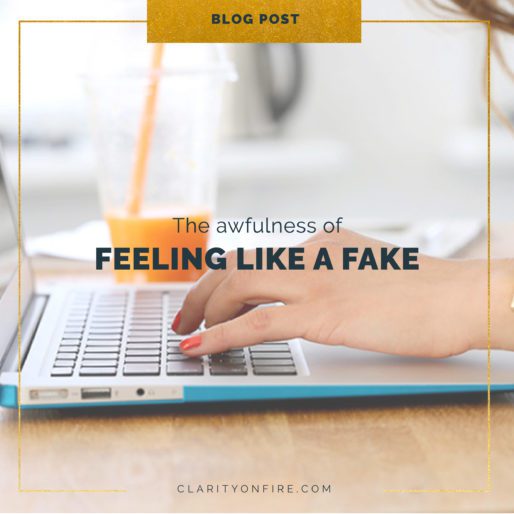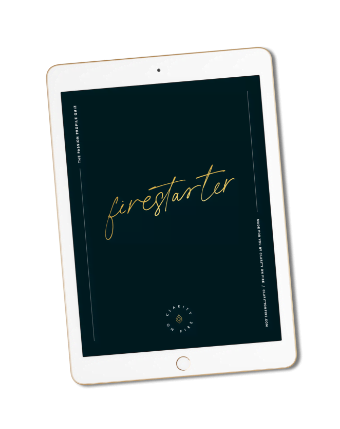One thing I’m pretty bad at is reminding myself how far I’ve come and staying grateful for how much my life has changed in just a few short years.
On a day-to-day basis, it feels like life is moving so slowly. But on the rare occasions when I pause to look back at where I was 5 years ago, 3 years ago, even one year ago … I can’t help but feel amazed by how much has changed.
I had one of those amazed, grateful, reflective moments just this past week when one of our PPVE members posted this in our group forum:
“I have trouble shaking the feeling that I am an undercover agent at work. I feel like I’m pretending to be someone I’m not.”
Ugh, do I remember that feeling well. It’s that sense that you can’t be entirely honest at work … like you’re hiding parts of yourself and no one knows the real you.
You feel like a fake, and every day it eats away at you a little more.
WHY WE PUT ON A SHOW
Countless clients have told me they feel like they have to act a certain way at work or else they’re going to be criticized, judged, overlooked, misunderstood, or even fired.
I personally felt this way in pretty much all of my past jobs. And not just my “adult” jobs — I felt like that when I worked at my college newspaper and even at my very first job at the pool snack bar when I was 15 years old.
So what’s the deal? What causes so many of us to feel inauthentic, stifled, and fake at work?
It’s usually caused by a few major things:
- You may be in an environment that’s completely wrong for you, and you can’t relate to the people around you.
- You might be looking for a new job and feel like you have to keep faking enthusiasm for your current job.
- You might have the common belief that you have to constantly be “professional” in a working environment. That being completely authentic would be somehow inappropriate.
- Maybe you just want to fit in and feel like a part of the team, so you hide parts of yourself that might make you stand out.
Every single one of those has been true for me. Sometimes I was just in the complete wrong environment, but most of the time I was the one stopping myself from being totally authentic out of fear.
It’s easy for me to forget how awful it was to feel like a fake every day, especially when I look around at my life now and realize that I’ve made an entire career out of being 100% myself. So I can tell you from the other side, it’s a huge relief to stop pretending.
THE SHOW MUST NOT GO ON
I had a client, Lisa, recently tell me she was in this situation. The clearer she got on what she wanted, the clearer it became that her current job wasn’t it. And yet, her superiors were always praising her and telling her their big plans for her advancement in the company.
She felt like she was putting on a show of enthusiasm for their vision of her future, even though she secretly wanted out ASAP.
That’s the worst part about feeling fake — you feel like you’re constantly “performing” instead of just being. Like you’re an actor, pretending to be some warped version of yourself.
I hear this happening to a lot of people at their jobs, of course, but it can also happen on dates, in interviews, with old friends who you’ve grown apart from, at networking events, or really anywhere that you’re nervous or uncomfortable.
You hear words coming out of your mouth, and part of you thinks, “Who is that talking right now? I don’t even recognize that person!”
Frankly, it’s exhausting. And it’s time to end the performance.
HOW TO START BEING MORE YOURSELF, EVEN WHEN IT’S UNCOMFORTABLE
When you stop pretending, that doesn’t mean you have to come into work and be grouchy and hate everything and show it, of course. It also doesn’t mean you have to disclose every little thing about yourself.
I understand that there are some things you just can’t share in a work environment. For the sake of your job security, you may have to stay quiet about the fact that you’re job searching. And there are definitely some personal stories that don’t have a place in the office.
I’m not asking you to have no filter about what you say or do at work — but I am pleading for you to stop putting on a show for other people’s benefit.
It’s downright exhausting to fake things like enthusiasm and excitement when you’re just not feeling it. And it sucks to set aside your personal ideas, opinions, and interests in the name of keeping the peace.
My client Lisa felt so much better when she stopped pretending to be onboard with her boss’ vision for her career, and instead responded with, “Thank you for believing in me. That really means a lot.” Still the truth, without the icky pretending.
So here are some other ways of being more yourself at work:
- Start by finding the people you feel most safe around, who make it easy for you to be yourself. Allow yourself to open up, little by little, to those people first.
- Stop answering questions with rote responses. (“Fine!” “Sure!” “No problem!”) Pause for a moment and answer based on how you actually feel.
- Stop feigning enthusiasm or interest when you’re not feeling it.
- Stop agreeing with other people (when you don’t really agree) just to keep the peace.
- Bring more of your personality into your workspace, in the form of art, hobbies, photos, your clothes, etc.
- Ask for what you need, whether it’s more feedback, a question answered, a meeting with someone, the chance to work remotely, etc.
- Speak up more, even when you think it’s not worth it.
DEALING WITH THE BACKLASH
When you stop putting on a performance for other people’s sake, it’s normal to be afraid of how they’re going to respond. You might feel like you’re bracing yourself for criticism or rejection or a negative review.
But you know what usually happens? … Nothing.
Most people will hardly even notice because they’re too caught up in their own stuff. And the ones who do? You just might start feeling more connected to them than ever.
In my last job, I was so afraid that being myself would be inappropriate and unprofessional. So I never felt very close to anyone the majority of the time I was working there, and I definitely never felt like I belonged. I felt like a huge fraud.
Then, once I decided to quit to work on my business, I took on a complete IDGAF attitude and decided to stop holding back the parts of myself that I thought were “inappropriate.” Not only did nothing bad happen … I ended up making an amazing friend (who I consider part of my tribe still today) AND my company asked me to come back and work as a coach, on my own terms.
The backlash that I’d been so worried about was totally nonexistent.
But for the record, if you start being more yourself and people do get upset or there is a backlash … that was never going to be the right place for you, anyway.
![]() When you pretend to be someone you’re not in order to belong, all you feel is lonelier.
When you pretend to be someone you’re not in order to belong, all you feel is lonelier.
Tell me, have you ever felt like a fake at work? What did you do to get over it? Or what are you willing to try? Leave a comment to let me know.
TOO LONG, DIDN’T READ? LISTEN, INSTEAD!
If reading long blogs just isn’t your deal, you’re in luck:
We’ve started recording our blogs for you!
Here’s Kristen reading this week’s blog:
Much Love,
Kristen (+ Rachel)




I just conveyed this entire message to my supervisor at work yesterday. This is how I’ve felt from the beginning, but I “played the game” because I was eager to move up and make more money every year. But now that it’s been 10 yrs and there’s no more room for growth, I’m over it and ready to move on. I’m looking forward to working in an environment where I can be authentic and true to myself. Great blog!
Lala, I’m really impressed that you had the courage to share this with your supervisor! I’m sure that felt like the first big step toward feeling more authentic and true to yourself at work.
I’m happy to hear that, after years of “playing the game,” you’re ready to move on and find someplace that allows (even encourages!) you to be totally yourself. I love how timely this post was for you!
I feel like a fake at work as well as outside of work. I recently was promoted (out of necessity- my supervisor relocated out of state) and most of the time I dont know what’s going on, besides the fact that I’m introverted and feel like I’m putting on a show in general. I’ve definitely been trying to be authentic while worrying about being professional at work. Its exhausting!
Michelle — As a fellow introvert, I totally understand that it feels vulnerable and uncomfortable to try to be yourself around everyone at work — especially when you feel like you don’t always know what’s going on. That’s seriously exhausting! Instead of trying to be more authentic in general (which is daunting), start by being more yourself around just one or two people at work, and choose the ones who feel safest to open up to. (That approach generally works best for introverts, anyway, whether at work or in your personal life.)
I also want you to consider redefining what “being professional” means to you. I think a lot of us have this idea of “professionalism” that’s kind of stiff and impersonal, but it doesn’t have to mean that at all. To you, being professional might mean doing quality work and bringing your A-game to every project, but it doesn’t have to mean stifling your personality.
Love the new audio recording feature! Great job!
Thanks, Amy! Glad you love the audio feature! We’re having fun with it. 🙂
I literally just wrote a blog post about feeling like an imposture in my life in general! I feel like I’m a fake adult because I’m 22 and don’t have the things I thought I would/I’m not doing what I thought I would be doing by this age. But I realised that this is my journey. And being myself, in every single way, is the only way I can live an authentic, happy life. I shouldn’t be worried about acceptance/rejection because I would never want to be in the presence of people who expect me to put on a performance. I’m now realising that if I continued with the job I hated or was in the wrong relationship for the sake of it, I wouldn’t be happy because I wouldn’t be me. This post just really reiterates how important it is to be you and live authentically. Thanks so much Kristen! Forever inspiring me. xo
I think it all comes down to our need of being liked and appreciated, so in order for people to like us we end up forgetting about our own needs and desires and we suddenly became someone else (a fake). Therefore the question is not how can I be more authentic at my job, but how can I stop wanting to be liked by everyone? I’ve always felt like a fake since primary school up to my college years, and after that, of course, at my job. Almost everywhere I go I feel like an intruder, like I don’t belong and that’s why I choose to put on a mask than to be authentic. And now I wonder: is the fact that I’m putting on a mask the reason why I’m feeling like an intruder everywhere I go? Maybe if I’d let myself be more relaxed and open I wouldn’t feel so estranged and disconnected from everyone. I think being fake comes from always searching the other’s confirmation and seeing your value through the eyes of others. Once I accept myself for who I am and stop searching my value in other people’s eyes, I will be able to be authentic and stop being a fake. Why would somebody hide and put on a mask if they would’ve accepted their true selves? I am far from knowing who I am and I don’t like myself so I hide and I choose to be fake. What do you think, girls? Kisses from Romania!
A few years ago in college (I went back as a “non-traditional” student at 28 to get my Bachelor’s) our class performed an exercise. We had to take a personality test judging our behavior inside vs. outside of work. These results were then given on a line graph. For most students, there was a gap between the two lines, sometimes a sizable one, meaning they act much differently at home than they do at work. The professor was surprised at my graph, because the two lines were sitting right on top of each other. Meaning, I act the same at home as I do in the workplace (running counter to the VERY strong “fake it ’til you make it” mentality at this college).
At first, these results worried me. Should I be altering my personality more to fit in and progress within the workplace? As I thought about this, it hit me: there’s *nothing* wrong with this! I’m polite, hard working, have good manners, and don’t lie, cheat or steal. I don’t gossip. I don’t throw anyone under the bus. So instead of being worried about little personality quirks, why don’t I try to find a company that would welcome my personality, instead of changing my personality to fit a company?!
Part of accepting these results was accepting the fact that I may never rise to senior management status or make tons of money. Probably not in a traditional workplace anyway, where herd mentality is rewarded. But that’s okay. I’ve used many of the techniques you outline in this post, and like you – the world didn’t collapse around me. In many cases, it’s worked out very much in my favor!
This is a great article about an important topic. Thanks. 🙂